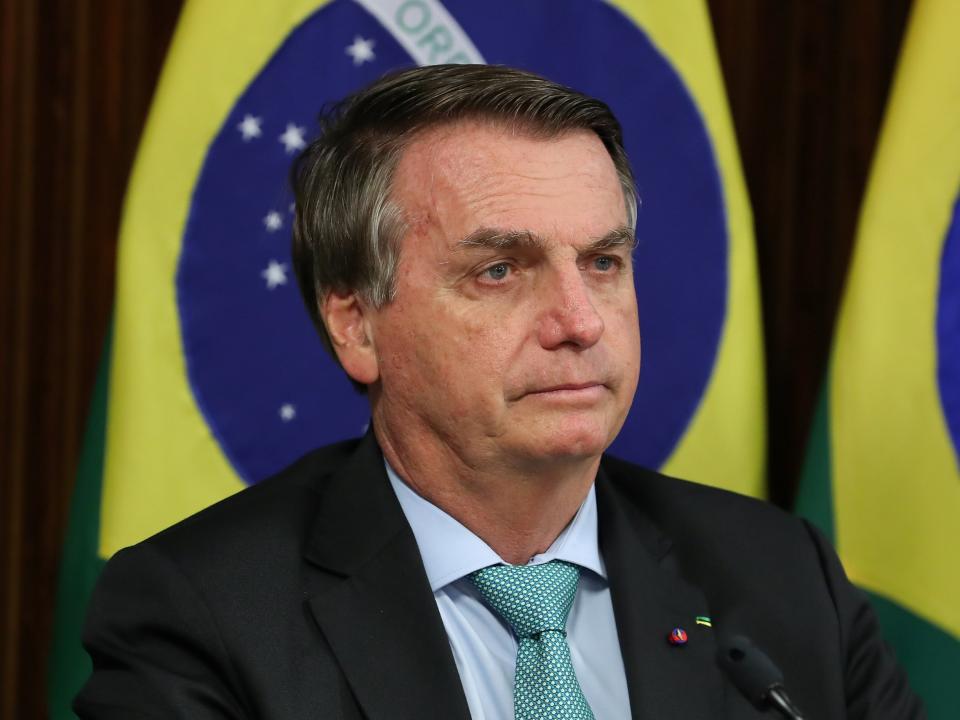Climate crisis: Deforestation of Amazon rainforest has accelerated since Bolsonaro took office, report finds

- Oops!Something went wrong.Please try again later.
The large-scale deforestation of the Amazon rainforest in Brazil has intensified under the leadership of outspoken right-wing populist leader Jair Bolsonaro, a new research paper has found.
Mr Bolsonaro used his appearance at his US counterpart Joe Biden’s White House climate summit last week to pledge an end to illegal logging in the Amazon by 2030, placing the blame for the global environmental crisis on developed nations whom he attacked for “burning fossil fuels in the course of the past two centuries”.
But his administration also failed to come to an agreement with the US on a deal to safeguard the country’s valuable rainforests, despite optimism that an accord could be forged prior to the gathering of 40 heads of state for Earth Day 2021.
The international spotlight falling on Mr Bolsonaro’s intentions towards the environment coincided with the publication of a damning new report by forestry engineer Ralph Trancoso of the University of Queensland in Australia in the academic journal Environmental Research Letters.
In “Changing Amazon Deforestation Patterns”, Mr Trancoso writes that, in the decade prior to Mr Bolsonaro’s election in 2019, the annual deforestation rate of the Amazon was 2,507 square miles.
Now 4,281 square miles are now being cleared every year, he reports, citing data from Brazil’s National Institute for Space Research, which has been monitoring Amazon deforestation since 1971.
Mr Trancoso puts the stark increase down to illegal loggers feeling emboldened to act by the new president’s indifference to the climate crisis and conservation.
“Imagine the annual deforestation rate as a cake which can be cut in a variety of ways depending on how hungry the guests are - or in this case, the loggers. Today, the cake is being cut into much larger chunks because the criminals are hungrier, driven by current environmental policies,” Mr Trancoso told Mongabay.
“The average size of deforested areas has increased 61 per cent under the Bolsonaro administration as compared to the previous decade [2009-2018] when policies were, to a certain extent, implemented.
“The current interest is to cut down a lot of trees,” he added. “Before, deforesters knew they could be caught, but now their posture seems to have changed. They are no longer afraid of governmental monitoring or controls. On the contrary: they feel driven to take down more forest because they know they won’t be penalised.”
Mr Trancoso has previously worked for the Brazilian government and advocates for policies like the Action Plan for the Prevention and Control of Deforestation in the Legal Amazon, which cut the annual rate of deforestation by 83 per cent between 2004 and 2013, before being cut by the country’s environment ministry in 2013 and abandoned entirely by Mr Bolsonaro last year.
Brazil’s environmental protection agencies suffered further cutbacks in 2020 as the coronavirus pandemic took hold and became a political priority.
But the engineer argues that the country does have the expertise to restrict the resurgence in illegal logging and said the crucial starting point is to identity whether small-scale family farmers or bigger organisations are involved.
“Nobody cuts down 100 hectares with a chainsaw. It involves giant machines, without a doubt,” he said. “If we know the type [of deforester at work], it’s easier to control and define policies to combat it.”

While many countries saw a reduction in their greenhouse gas emissions last year as their economies ground to a halt because of national lockdowns, Brazil’s actually increased by 20 per cent because of increased deforestation and cattle ranching, the Brazilian advocacy group the Climate Observatory has said.
On the devastation done to the Amazon rainforest, which plays a vital role in regulating global climate, Mr Trancoso said: “The larger the destroyed area, the harder it is for it to regenerate. Animals no longer live there and the seed stock of the soil is exhausted. Natural regeneration becomes seriously compromised.”
Mr Trancoso argued that economic pressure from the international community, like agreements not to buy beef or soybean exports cultivated on deforested land, is crucial to ensuring the Bolsonaro administration plays ball on the environment.
“Brazil has to feel the pressure from the economic side. Just environmental issues aren’t enough for the current administration,” he said.
“Broad patches of deforestation are easier to see on satellite images and also facilitate concentrating forces in the field to apply fiscal controls. Initiatives that worked in the past must be taken up again.”
Read More
Climate crisis: UK, US and Norway unite for $1bn rainforest protection initiative
Two new species of ‘critically endangered’ owl discovered in Amazon rainforest

